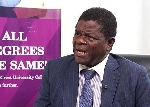The law is clear: MCEs derive authority from the Assembly, not MPs- NALAG President
 Mr. Alfred Asiedu Adjei
Mr. Alfred Asiedu Adjei
In an exclusive clarification, the President of the National Association of Local Authorities of Ghana (NALAG), Mr. Alfred Asiedu Adjei, has responded to recent comments made by the Chairperson of the Committee on Local Government and Rural Development, who suggested that “an MCE cannot work without MPs.”
Mr. Asiedu Adjei, who has also served as the Presiding Member of the Accra Metropolitan Assembly for four consecutive terms, emphasised that while collaboration between Metropolitan, Municipal, and District Assemblies (MMDAs) and Members of Parliament (MPs) is important, the statement fundamentally misrepresents the constitutional and legal framework of Ghana’s decentralisation system.
1. The Constitutional Foundation of Local Government
Mr. Asiedu Adjei cited the 1992 Constitution as the supreme legal basis for local governance.
Article 240(2)(b) requires Parliament to ensure accountability of local government authorities through sound financial management.
Article 242 clearly outlines the composition of a District Assembly:
The District Chief Executive (appointed by the President and approved by the Assembly).
Two-thirds of members are elected by universal adult suffrage.
Not more than one-third appointed by the President in consultation with traditional authorities and other interest groups.
The Member(s) of Parliament representing constituencies within the district, who are members without the right to vote.
“This clearly shows that MPs are not decision-makers within the Assembly,” Mr. Asiedu Adjei explained.
“They participate, but cannot dictate or veto MMDA decisions.”
2. The Role of MCEs under Act 936
Drawing on the Local Governance Act, 2016 (Act 936), Mr. Asiedu Adjei reinforced the independence of MMDAs:
Section 20(1) defines the District Assembly as “the highest political authority in the district with deliberative, legislative and executive powers.”
Section 29(1) vests executive authority in the Metropolitan/Municipal/District Chief Executive (MCE/DCE), who oversees daily executive and administrative functions.
“The law is clear: the MCE’s mandate emanates from the Assembly as a corporate body, not from the Member of Parliament,” he said.
3. The Role of MPs vis-à-vis MMDAs
Mr. Asiedu Adjei stressed that MPs primarily serve in Parliament, representing their constituencies in national law-making and oversight.
Their involvement in District Assemblies is ancillary, serving as a bridge between Parliament and local development processes, but without voting rights (Article 242(d)).
The District Assemblies Common Fund Act (Act 455) provides MPs with a separate allocation (the MPs’ Common Fund), distinct from the Assembly’s statutory budget.
“While MPs may lobby and advocate for development projects, the MCE is not legally bound to work ‘under’ or ‘through’ them,” he noted.
4. On Collaboration and Good Governance
Mr. Asiedu Adjei acknowledged that decentralisation thrives on cooperation between MMDAs, MPs, traditional authorities, and civil society.
“Best practice requires MCEs and MPs to coordinate to avoid duplication and maximise development impact.
But cooperation does not mean dependency or subordination,” he emphasised.
5. Conclusion
In conclusion, Mr. Asiedu Adjei reiterated that the assertion that “an MCE cannot work without MPs” is inconsistent with the 1992 Constitution, Act 936, and all relevant Legislative Instruments.
“MMDAs are designed as autonomous local government authorities with clear constitutional and statutory mandates.
While partnership with MPs is desirable, the executive authority, accountability, and functionality of an MMDA do not depend on an MP,” he asserted.
He added that strengthening this distinction is critical to ensuring that Ghana’s decentralisation system remains true to its original purpose—empowering local governments to be responsive, accountable, and development-oriented.
Source: Classfmonline.com/cecil Mensah
Trending News

Bawumia outlines welfare programme to support NPP delegates
17:44
Phase two of National Chairman’s Thank You Tour continues in Eastern Region
02:31
Nana Addo appointed ‘babies’ as Chief Justice-Ansah Asare
17:41
V/R: TEWU declares nationwide strike over gov't's persistent failure to resolve the concerns of non-teaching staff
18:33
Venture into "Nkukor Nkitinkiti" business- Journalist tells sacked Chief Justice Torkornoo
01:23
UNGA 80: President Mahama strongly appeals to UN to halt 'crimes' being committed in Gaza
19:37
Tijjanniya Muslim Council rejects legitimacy of newly formed National Muslim Conference
02:15
B/R: NEIP CEO supports victims of Sampa Market fire outbreak
19:33
UNGA 80th Session: First Lady Lordina Mahama calls for stronger global collaboration to build world peace
14:15
OSP begins probe into alleged corruption at scholarship secretariat, invites petitioners
01:12




